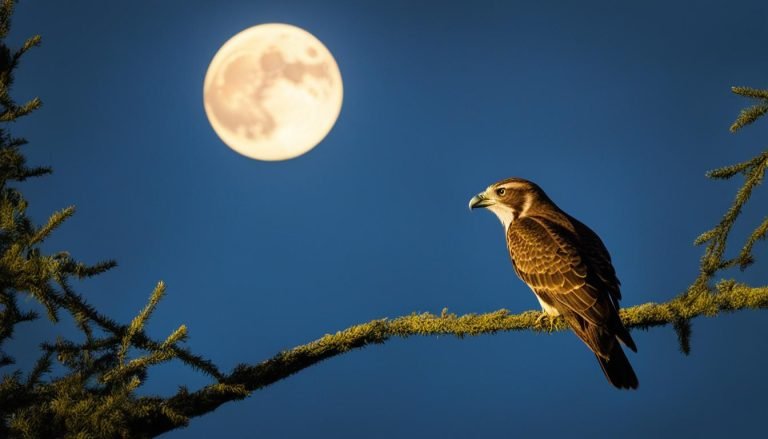What Do Lions Do During the Night?
As fascinating and beautiful predators, lions have aroused the curiosity of humans for centuries. While most of us have seen lions basking in the sun during the day, few are aware of what they do after sunset.
So, what do lions do during the night?
As a nocturnal species, lions’ activities after sunset are distinctly different from their daytime behavior.
Lions are dynamic creatures that exhibit a wide range of behaviors under the cover of darkness.
Key Takeaways
- Lions are active and dynamic creatures that exhibit distinct behaviors during the night.
- Nocturnal activities of lions include hunting, socializing, resting, marking territory, and patrolling.
- Lions’ nighttime habits have evolved through natural selection and adaptation.
- Understanding lions’ nighttime behavior is crucial for their conservation and management.
- Moonlight and other environmental factors influence the behavior of lions at night.
The Lions’ Nighttime Environment
As nocturnal animals, lions are highly adapted to their environment after sunset. Their behavior is largely influenced by various factors such as their habitat, prey availability, and territorial range.
Lions inhabit diverse environments, from the grasslands of Africa to the forests of Asia. In Africa, they are found in savannas, woodlands, and scrublands. In contrast, in Asia, they inhabit dense forests and grasslands near water sources. The nature of their environment largely influences their behavior at night, and they adapt to it through various survival strategies.
Prey availability is a crucial factor that affects lions’ behavior at night. They prefer hunting in large grasslands, where prey is abundant and more comfortable to see. Therefore, lions that inhabit such areas tend to be more active at night, moving around and engaging in hunting strategies. In contrast, those who live in dense forests tend to be less active as it is challenging to spot prey in such environments.
The territorial range also influences lions’ behavior at night. A lion’s territory is its home range, and they patrol it regularly to keep other lions and predators away. Their territorial range is significant in determining how they navigate their environment after sunset.
The Lions’ Nighttime Environment plays a vital role in shaping their behavior during the night and their overall nocturnal habits.
What Do Lions Do During the Night: Hunting Strategies in the Dark
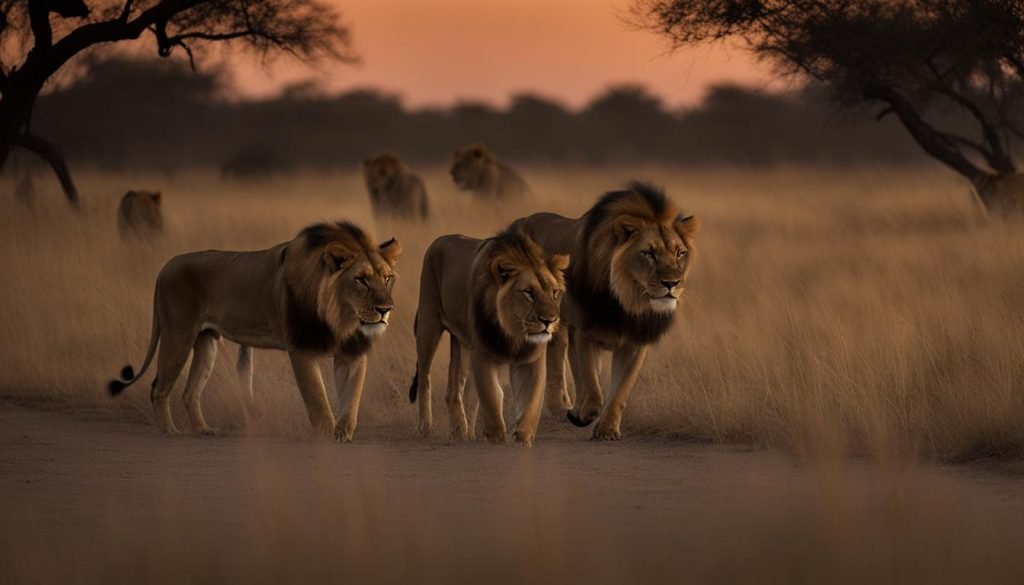
Lions are apex predators and skilled hunters. During the night, these big cats rely on their exceptional senses and hunting strategies to find and capture prey. Their acute senses of hearing, sight, and smell allow lions to detect prey from great distances, even in the dark.
Their hunting strategies often involve collective efforts and stealthy movements to achieve success. For instance, lionesses work in coordinated teams to stalk and ambush prey, while male lions use their strength and power to take down larger prey such as buffalos. Moreover, lions use the cover of darkness to their advantage, relying on their excellent night vision to surprise their prey and launch a successful attack.
A study conducted by the University of Minnesota revealed that lions’ hunting success is influenced by various factors such as moonlight intensity and prey behavior. Increased moonlight can enhance visibility, thereby increasing success rates, while unpredictable prey movements can lower success rates.
“Lions are master hunters and use their collective strength, stealth, and excellent senses to capture prey during the night.”
Overall, lions’ hunting strategies during the night are essential for their survival and the survival of their pride. These big cats have adapted their hunting skills over time, allowing them to thrive and play a crucial role in the ecosystem.
Social Interactions and Communication
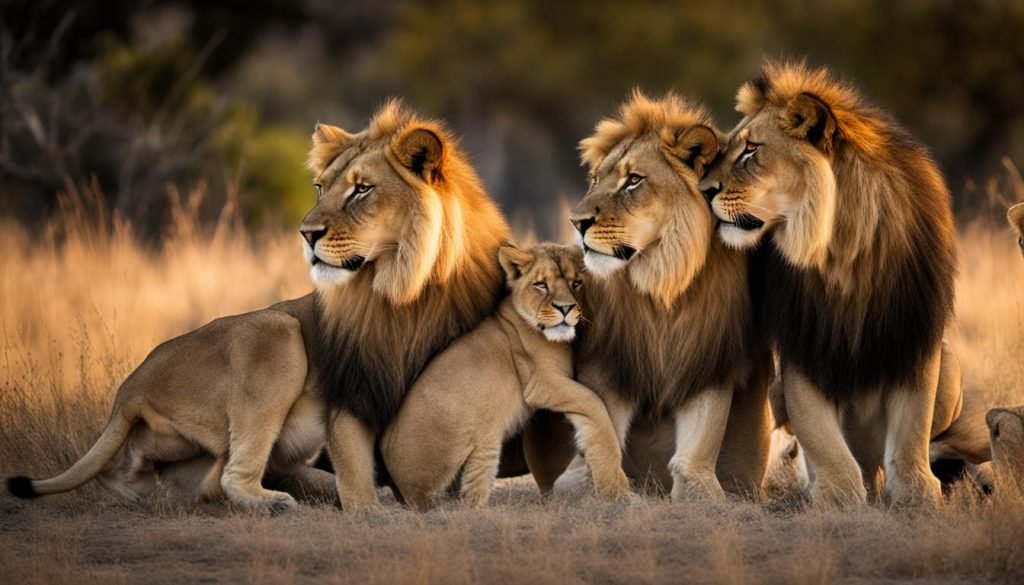
As highly social animals, lions engage in various social interactions, including vocalizations and body language, even during the night. Body language is crucial in maintaining social bonds, while vocalizations serve different purposes, such as communication within the pride or warnings of potential danger.
The most commonly known vocalizations of lions are roars, which can be heard up to 8 kilometers (5 miles) away and often serve as territorial calls to other prides. Lions also use growls, moans, and grunts to communicate with one another. Foot stomping and tail twitching can also indicate a lion’s mood or intentions.
Lion cubs play an important role in socializing with their peers and learning crucial skills for survival. They spend a significant amount of time playing, which helps them develop physical and social skills they will need in the future.
Overall, social interactions and communication are essential components of lions’ nocturnal behavior, and their hi-tech social skills ensure their survival in the harsh environment they inhabit.
Resting and Sleeping Patterns
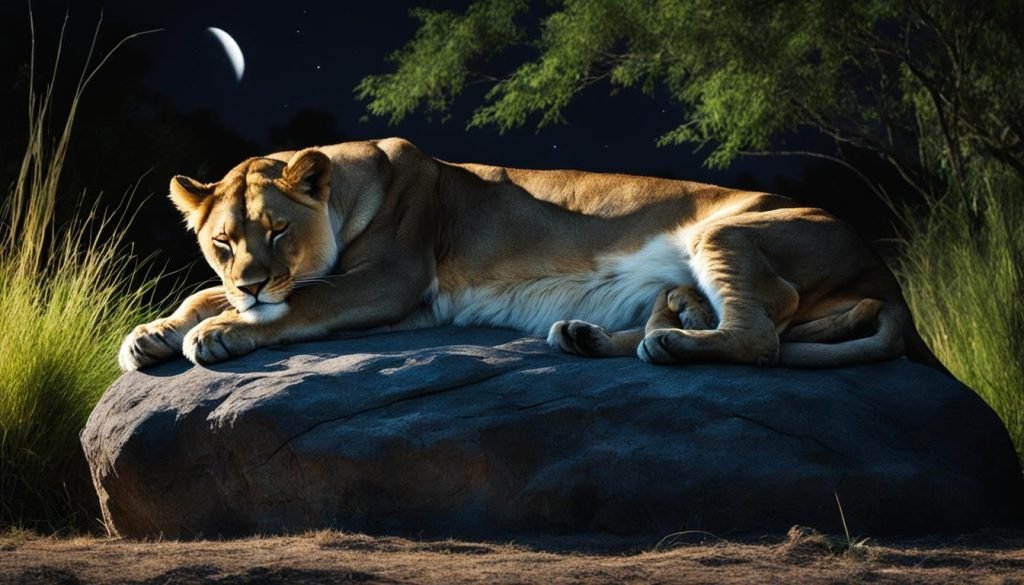
Lions are the epitome of strength and power, but even they need their rest. During the night, lions spend a significant portion of their time sleeping or resting. Adult lions spend an average of 16-18 hours each day inactive, conserving energy for hunting and protecting their pride. Lionesses, on the other hand, are more active in the pride, taking on the responsibility of hunting, mothering, and patrolling.
While lions sleep, they adopt several positions, including lying on their backs, sides, or belly, with their feet tucked beneath their body, and their head resting on their paws. When it is time to switch guard duties, lions rouse and move to ensure that a fresh pair of eyes is keeping watch over the pride.
One study found that a pride’s location and availability of prey affect their sleeping patterns, with lions in areas with fewer prey sources sleeping less and spending more time hunting during the night. In areas with adequate prey numbers, lions tend to sleep longer, up to 20 hours in some cases.
Marking Territory and Patrolling
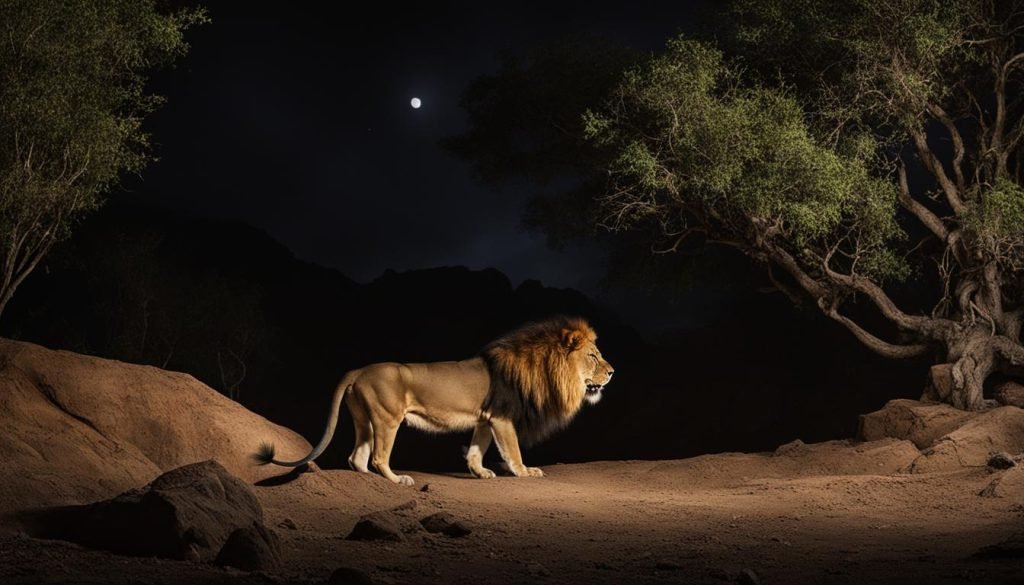
Lions are territorial animals, and they defend their territories vigorously. Even during the night, lions maintain their boundaries by marking their territories with scent markings and patrolling to deter potential intruders. Male lions mark their territories to warn other males to stay away and prevent them from mating with their females.
During the patrolling process, lions often roar, letting other lion prides know that the territory is already taken. The roaring can be intense and loud, and it can be heard from a distance of approximately five miles. Other displays of intimidating behavior include digging up the soil, spraying urine and defecation, and rubbing their faces against stones and bushes. These displays have the advantage of being highly visible during the daytime and highly scented during the night.
Lions will patrol their territories every couple of days, depending on the conditions and challenges of securing their territory. For example, if there is a severe drought, lions may have to patrol more frequently due to a decline in food and water resources.
Marking methods
| Method | Description |
|---|---|
| Urine spray | Lions use urine to spray on trees, bushes, and other objects to mark their territory. |
| Fecal deposits | Lions use their feces to mark their territory. The placement of fecal matter is strategic as lions place it in areas highly visible during the daytime and highly scented during the night. |
| Scratch marks | Male lions use their sharp paws to dig up the soil and create scratch marks on trees and bushes to mark their territory. |
Maintaining dietary and territorial boundaries is essential to ensure that lions have access to sufficient food and water resources to survive and reproduce. Lions’ territorial behaviors are crucial in promoting sustainable ecosystems, balancing predator and prey populations, and contributing to biodiversity.
Interactions with Other Nocturnal Predators
Lions are not the only nocturnal predators that roam the African savannahs. Sharing their habitats are other predators such as hyenas, leopards, and cheetahs, who have adapted to the elusive opportunities of the African night.
These predators have complex and dynamic relationships, ranging from intense competition to occasional cooperation. For example, lions often compete with hyenas for food sources, and a confrontation between the two species can be deadly. On the other hand, cheetahs and leopards are more solitary and try to avoid confrontations with lions.
“In some instances, lions and hyenas could work together to achieve similar goals, like scavenging an already-killed animal.” – WildAid Africa
Research has revealed that social behaviors and vocalizations play a crucial role in defining these predator-predator relationships. For example, hyenas have different vocalizations for intruders versus group members, and lions have an array of vocalizations from roars, grunts, and growls that communicate different messages such as territory marking, hunting strategies, and social coordination.
The image above represents the nocturnal ecosystem of African savannahs; lions and other nocturnal predators are competing for hunting opportunities, interacting, and co-existing in the darkness of the night.
Conservation and Human-Lion Conflict
Lions are an iconic species facing various conservation challenges, particularly when it comes to human-lion conflict. This occurs when humans and lions come into conflict due to habitat encroachment, livestock predation, and retaliatory killings. As human populations grow and expand, lion populations continue to decline, making conservation efforts more critical than ever.
Lion populations are decreasing due to habitat loss and fragmentation, conflict with humans, poaching, and trophy hunting. In some areas, lions are killed due to retaliation for livestock predation, posing a significant threat to the species.
“Human-lion conflict is a growing issue that demands proactive and innovative solutions to mitigate its impact,” says wildlife conservationist Johnathan Smith.
Various conservation initiatives seek to protect lions and reduce human-lion conflict. For instance, some conservation groups work with local communities to promote sustainable practices, such as using predator-proof enclosures for their livestock and promoting ecotourism as an alternative income source.
It is crucial to educate people about the importance of lions in maintaining a healthy ecosystem and their cultural significance. Lions form a critical part of many African cultures and are revered as symbols of strength and power.
Conservation efforts are essential to the survival of lions and the many other species that make up our planet’s rich biodiversity.
The Role of Moonlight in Lions’ Behavior
As nocturnal predators, lions rely heavily on moonlight to navigate their environment and carry out their activities during the night. Moonlight can influence various aspects of their behavior, including their hunting success, visibility, and activity levels.
The brightness of the moon can impact a lion’s ability to hunt successfully at night. In areas with bright moonlight, lions may experience reduced success rates in hunting due to increased visibility to their prey, making it easier for their prey to detect and evade them. In contrast, in areas with low moonlight, they may experience difficulty in detecting prey, making it harder for them to locate and capture prey.
Furthermore, the brightness of the moon can also affect the visibility of group members during social interactions and communication. Lions may rely on visual cues to communicate with other members of their pride, and bright moonlight can help facilitate these interactions.
Overall, the role of moonlight in lion behavior is crucial to their survival and success as nocturnal predators.
“The brightness of the moon can impact a lion’s ability to hunt successfully at night.”
Adaptations for Nighttime Survival
Lions have developed unique adaptations that enable them to thrive in the dark and hunt more efficiently during the night. One of their most notable adaptations is their excellent night vision, which allows them to see in low-light conditions and detect their prey from afar. Their eyes contain a high density of rod cells, which enhance their visual sensitivity and enable them to perceive movement in the dark.
In addition, lions have sensitive hearing, which they rely on to detect the sounds made by their prey as well as other nocturnal predators such as hyenas and leopards. They can distinguish sounds from miles away, enabling them to locate and track their prey, communicate with their pride members, and avoid potential threats.
Lions are also stealthy predators. They have evolved to move quietly in the dark, thanks to their soft paw pads, which reduce noise and prevent the detection of their movements by their prey. Lions can sneak up on their prey without being detected, giving them a higher chance of success during hunts.
Overall, lions’ adaptations for nighttime survival enable them to effectively navigate through their environment, hunt and capture prey, communicate with their pride members, and maintain their territorial boundaries even after sunset.
The Intriguing World of Lions at Night
Lions are truly magnificent creatures, and their nighttime activities are no exception. As the sun sets and darkness envelops the savannah, lions emerge as skilled predators, social animals, and territorial guardians. Their ability to thrive in the darkness is a testimony to their evolution and adaptation.
The Intriguing World of Lions at Night offers a glimpse into the fascinating behaviors and survival strategies of lions after sunset. Whether they are hunting, communicating, resting, or patrolling their territory, lions display a remarkable level of coordination and cooperation.
The nocturnal habits of lions are also critical to the ecosystem, as they play a crucial role in balancing predator-prey relationships and maintaining the delicate ecological balance of their habitats.
Although they face numerous conservation challenges, such as human-wildlife conflicts and habitat loss, lions’ nighttime activities continue to inspire awe and curiosity among wildlife enthusiasts and scientists alike.
The Intriguing World of Lions at Night proves that there is much more to these magnificent creatures than what meets the eye, and their behavior during the night is just as remarkable as their daytime activities. To truly appreciate the beauty and complexity of lions, one must delve into their nighttime world and explore their intriguing habits and adaptations.
More About Lions:
- How Long Do Lions Live? Wild vs Captivity
- How Fast Can Lions Run?
- Can Lions Swim? Lion’s Swimming Ability Examined
- Cannibalism in Lions: Do Lions Eat Other Lions?
- How Long Are Lions Pregnant? Gestation Period
- How Big Can Lions Get? Lion Size Chart
- How Much Do Lions Weigh? Lion’s Weight Revealed
- Do Lions Hibernate During Winter?







